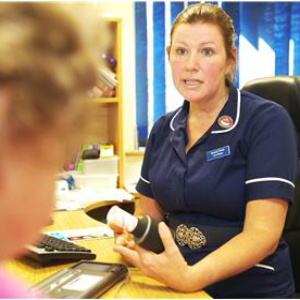Name Puddletown Surgery, Dorset
List size 4,100
Patient satisfaction The surgery is one of 54 practices that scored 100% in the GP Patient Survey
Full-time equivalent GPs 2.25
A manageable list size is key to providing quality care
Our list is gradually increasing by about 3% a year, and while we are increasing our facilities and services to accommodate, we don’t want to expand too quickly. We control our list by taking anyone who moves out of our area off it, whereas at one time we might have kept them on. We practise in a rural area, which covers about 10 square miles, and so when the list has expanded in the past, neither GPs nor nurses have been able to cope with the strain of making home visits further afield. Now if new patients want to register, we check very carefully where they live.
If we started to get too many patients on our list, the quality of service would fall. Luckily for us, we don’t have the large fluctuations in population seen in other areas and services are improving in other surgeries.
Our access policy has won patient approval
We run an open surgery between 9am and 10.30am, and patients don’t need to book an appointment. Patients can also phone to speak to a GP between 8.30am and 9am, and between 3.30pm and 4pm, although doctors will also ring patients back outside those slots.
If a patient rings and wants to speak to the doctor, we put them through. If the doctor’s already on the phone, the patient is called back straight away.
We have always run Saturday morning surgeries, for which patients don’t need to book an appointment – and they’re not for urgent cases, they’re ordinary open surgery appointments.
We trialled employing nurse practitioners but they didn’t work very well here, because access to the doctors was too good.
Having a patient participation group helps us improve our service
We’ve had a patient participation group since 2004. It’s a mature group that’s very good at harvesting feedback about the surgery. It has arranged education sessions – for example, last year it organised an asthma education session for other patients.
Complaints can help us to make useful improvements to our services – the patient participation group pointed out that evening appointments were hard to get, which prompted us to work to provide extra evening surgeries.
Our integrated nursing team ensures continuity of care
Our nursing team is popular because it delivers excellent continuity of care. The team of four reduces strain on our GPs by looking after patients in the surgery and in their own homes – they do practice and community nursing.
The nurses also have specialisms ranging from respiratory care and diabetes to palliative care and wound management.
Meeting patient needs improves job satisfaction for staff
Our receptionists can mostly say ‘yes’ to patients. This gives them a good sense of being able to give people what they want, which in turn provides job satisfaction. It’s horrible not being able to offer an appointment when somebody wants it, but if you can say, ‘come in and see a doctor this morning’, it makes everybody feel good.
It’s a positive feedback loop. When we’ve needed new staff we’ve been able to recruit quite easily.

















